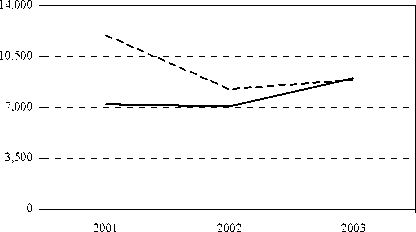Greece: the 2003 Deficit Outturn
At the beginning of March 2004, in its first notification of the 2003 fiscal outcome,
Greece estimated the general government deficit at 1.7 percent of GDP, as against 1.4
percent in 2002. At that time, the most up-to-date forecasts by international institutions
were broadly in line with the data notified by Greece. After several revisions, the 2003
deficit is currently estimated to be 5.8 percent of GDP.
Revisions occurred between March 2004 and March 2006. Indeed, already by the end of
March 2004 Greece sent updated data to the European Commission, revising upwards the
2003 deficit to 3.0 percent of GDP. In April, in publishing the Spring forecasts, the
Commission took into account the latter notification. It stressed that “the data for 2003
are not yet validated by Eurostat and do not therefore provide a reliable basis for
assessing the budgetary situation at this stage”. The Commission also noted that “[a] fact-
finding mission is being prepared for the end of April in order to have more information
about the budgetary situation in this country and decide on steps to be taken”.
At the beginning of May, following an additional notification, Eurostat verified that in
2003 the general government deficit was 3.2 percent of GDP. In September, the deficit
and debt figures for the years 2000-03 were significantly revised. In particular, the 2003
deficit was estimated at 4.6 percent of GDP and the 2003 debt was indicated at 109.9
percent of GDP.
Both in the March 2005 Notification and in the September 2005 one, Greece revised the
2003 deficit upwards by more than half a percentage point of GDP (to 5.2 and 5.7 percent
of GDP, respectively). In March 2006 the 2003 deficit was estimated to be 5.8 percent of
GDP.
Figure 6.3 Greece: Net Borrowing and Change in Debt (millions of euro)
A - The picture taken in March 2004 B - The picture taken in April 2006
14,000 -,----------------------------------------------------------------------------------
10,500 -----------------------------
7,000 --------------------------------
3,500 --------------------------------
0 -I-------------------------------------------------------------1--------------------------------------------------------------1--------------------------------------
2001 2002 2003

-------Net borrowing----Change in debt
-------Net borrowing----Change in debt
As to the deficit, the overall revisions were essentially due to: lower tax revenue (mainly
VAT); lower payments received from EU institutions in the context of structural funds
programmes; the reclassification, as a financial transaction, of a payment from the Saving
Postal Bank to government; upward revisions of military expenditure and of interest
payments; lower than expected surpluses of social security funds; and incorrect recording
of hospitals’ expenditure.
With reference to the debt, the revisions were due to the previous underestimation of
bonds with capitalised interests and to the overestimation of consolidating assets of social
security.
171
More intriguing information
1. Types of Tax Concessions for Promoting Investment in Free Economic and Trade Areas2. The name is absent
3. The name is absent
4. CONSIDERATIONS CONCERNING THE ROLE OF ACCOUNTING AS INFORMATIONAL SYSTEM AND ASSISTANCE OF DECISION
5. The name is absent
6. Does adult education at upper secondary level influence annual wage earnings?
7. Transgression et Contestation Dans Ie conte diderotien. Pierre Hartmann Strasbourg
8. The constitution and evolution of the stars
9. The Advantage of Cooperatives under Asymmetric Cost Information
10. Estimated Open Economy New Keynesian Phillips Curves for the G7